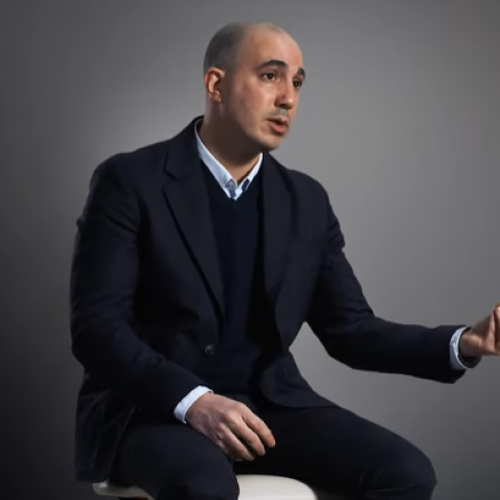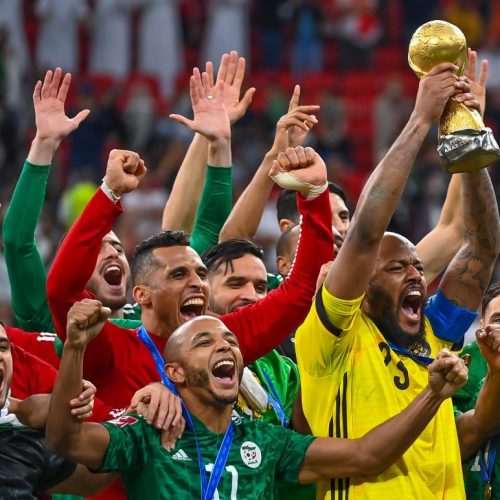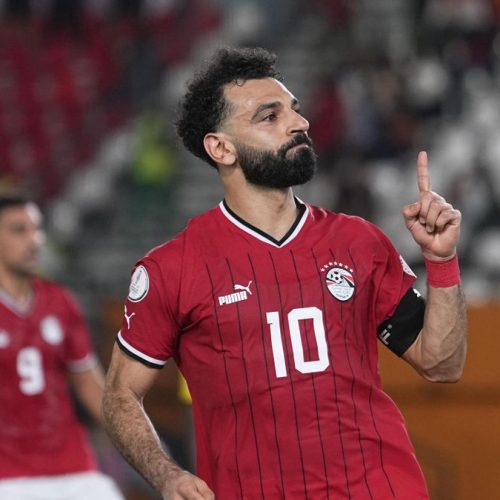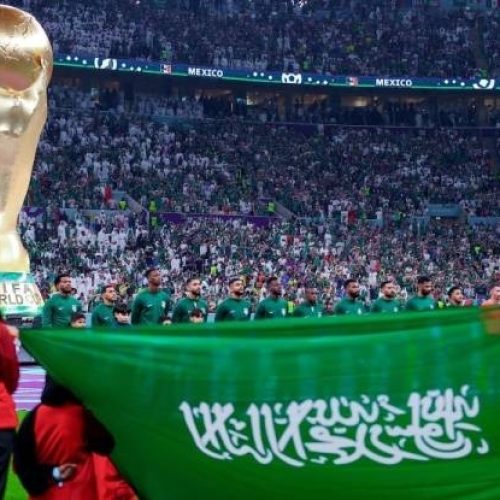It’s a conversation as old as time. You don’t have to be a brain surgeon to acknowledge that most of the representation we have had over the years is constantly tinted in dark, punctuated with out-of-touch stereotypes, and dyed in deep levels of biased narratives and damaging clichés. Constantly viewed and referred to as something we are not, this negative perception has stuck with most, not to say all, people that hail from the so-called Arab World up until today, plaguing most industries we decide to get ourselves involved in and associated with.
In movies we’re terrorists, in newspapers we’re assailants (or also terrorists), and in business, we’re opportunistic and perfidious. Whatever the move, discipline, or sector, we’re constantly dealt an unfair hand and burdened by preconceived notions that cloud the perception of our true capabilities and contributions. And the world of football, despite its cohesive nature, is, unfortunately, no exception.
Seven months ago, headlines were flooding under the mounting pressure put under the FIFA World Cup’s first time being organized on our turf — in Qatar — with fingers constantly being pointed towards the several allegations of corruption, financial embezzlement, and human rights breaches. We said it back then and we’ll say it again, there’s a substantial amount of issues that the Gulf State could, and most importantly should, have handled better, however, it is unfortunately not the only host country in the quadrennial tournament’s history to have followed in that path, though it is the only nation to face such a large amount of adversity, controversy, and scrutiny from the public eye.
Far from wanting to absolve the petrodollar state from any of its serious transgressions and alarming infringements, when trying to locate the X factor in what makes Qatar’s case so different from any other, it becomes increasingly clear that xenophobia, racism, and Islamophobia collectively play the role of a magnifying glass that distorts and amplifies the flaws and shortcomings of the country’s recent hosting— a claim that only seems to be gaining more merit when we look at the controversies revolving around Saudi Arabia’s recent dealings in the global football landscape.
Part of the greater blueprint Crown Prince Mohammed bin Salman has for Saudi Arabia through Vision 2030— an all-encompassing economic, political, and cultural program that seeks to diversify the country’s revenue away from oil — the Gulf State’s own domestic league, the Saudi Pro League, has been leading the charge these past two transfer windows by attracting some of the sport’s most iconic players over in an attempt to establish itself as a global football powerhouse and showcase Saudi Arabia’s growing influence in the world of sports.
In a handful of months, the international community has already witnessed four of the most prominent Saudi clubs nationalize and attract a fair number of the world’s greatest players including Cristiano Ronaldo in January, 2022 Ballon D’or recipient Karim Benzema last month, in addition to 2018 World Cup winner N’golo Kante mere days afterward. Retired footballers were also called-up to bring their legacy and expertise to the country’s own league, with former Liverpool midfielder Steven Gerrard having notably made the move over to the Arab nation as head manager of Western Saudi club, Al-Ettifaq. As you could’ve imagined, it didn’t take long for Qatar’s detractors to look over the fence and start arguing against Saudi’s case in the footballing realm.
Ex-Liverpool FC player turned BBC pundit Jamie Carragher labeled the current push as “sportswashing” while former Manchester United player, also now a commentator for the BBC, Gary Neville, was recently seen ranting on his Instagram story, furiously demanding Premier League officials to “look into this Saudi trading like NOW!!!!” and requesting the enforcement of “a regulator (…) that’s agile enough to stop these things at source.”
Sports washing 😂😂😂Carragher take a day off
— Julian Munoz (@JulianTheGuapo) June 21, 2023
On Twitter, the same line of thought seems to follow with users claiming that Saudi Arabia is “killing” football by striking deals with prominent players and plucking them out of their natural teams and league for their sole own benefit.
Bro wtf is this? Saudis killing European football with money https://t.co/NqfwDdRz3C
— Hector. (@HexHeizzy) July 10, 2023
This sentiment, which is fueled by the perception that transactions are primarily driven by financial motives rather than genuine sporting spirit that fans associate with the game, argues that such moves disrupt the competitive balance and integrity of football, transforming it into a playground for the wealthy and jeopardizing the intricate essence of fair competition. With that being said, for us inhabitants of the southern bank of the Mediterranean, the arguments put forward only seem to reflect, once again, the Western World’s prejudice against the region, highlighting another glaring case of double standards.
While scrutinizing the deals made by Saudi Arabia, critics conveniently overlook similar instances of wealthy clubs and leagues in the Western World engaging in high-profile transfers and financially driven practices— as it has traditionally been the case with the Major League Soccer (MLS), the United States’ own domestic league, which has attracted prominent players by means of monetary gain rather than another athletic challenge in order to foster a competitive league of their own.
Major signings over the last decade, which include David Beckham and Zlatan Ibrahimovic’s move to LA Galaxy, Thierry Henry’s stint with NY Red Bulls, or also Wayne Rooney to DC United, exemplify how financial considerations have influenced player transfers and team compositions.
However, no one seemed to bat an eye about America’s repeal of sexual and reproductive rights, arbitrary detention in migration centers, police brutality, and so on, which leads one to wonder whether human rights breaches are only important or deemed worthy of the spotlight when they are associated with countries outside the West or they align with particular political agendas.
The MLS’s recruitment of soon-to-be-retired players to boost the league’s visibility at considerable wages and transfer fees went largely unnoticed and uncriticized. No one raised concerns about how their stint in the MLS might tarnish their careers or accused them of undermining the essence of football, which now begs the question of where do we draw the line? What determines when a transfer is seen as a strategic move for league growth versus a detrimental blow to the integrity of the sport?
We don’t even need to cross the Atlantic to see these dynamics take place. The phenomenon of talent acquisition by European football clubs directly from South America has been an ongoing practice that cries for close investigation.
Talent scouts are usually dispatched to identify promising young players, often acquired for nominal fees, who are swiftly integrated into their European sides, where they eventually reach their full potential, flourish, and amass trophies. This systemic approach has had a profound impact on South American leagues, as their homegrown talents barely get a chance to mature before they are basically snatched away to destinations like Madrid, London, Manchester, or Munich.
Historical examples such as Neymar, Ronaldo (R9), Vinicius, Rodrygo, and many others further exemplify this trend which raises valid questions about whether such practices undermine the fairness and integrity of the game and whether European clubs are effectively siphoning talent from other regions, essentially depriving them of their key resources for their own competitive advantage. Or is it only an issue when Saudi Arabia is reciprocating the same practice, giving a taste of their own medicine to those who have long engaged in it?
Seemingly specialists in the realm of double standards and selective indignation, certain stakeholders within the football world will conveniently turn a blind eye to their own questionable practices while vehemently criticizing others for similar actions. Another example lies within the recruit of Israeli players in squads, as seen with the recent transfer of Manor Solomon to Tottenham FC, while Russian players are still called to be left out as to not damage the integrity of the club or sport.
In the case of football, it seems that some are more inclined to choose their battles based on personal biases, political agendas, or financial interests rather than consistent principles or a genuine commitment to upholding the integrity of the sport.This selective approach not only undermines the credibility of the football community but also raises some serious doubts about the fairness and transparency of decision-making processes and the foundation on which the sport as a whole operates.









